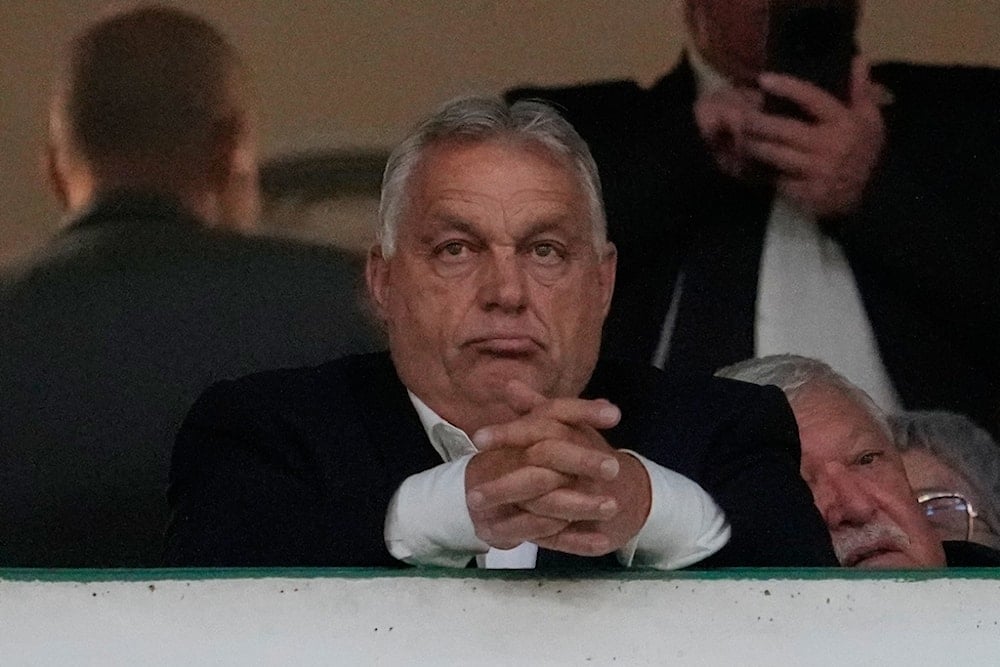Orban clashes with Kiev as corruption scandal linked to Zelensky grows
Hungary's refusal to fund Ukraine escalated into a diplomatic clash as a sweeping corruption scandal inside Kiev intensifies political turmoil.
-

Hungarian Prime Minister Viktor Orban watches a World Cup 2026 group F qualifying soccer match between Portugal and Hungary in Lisbon, Tuesday, Oct. 14, 2025. (AP Photo/Armando Franca)
A diplomatic clash erupted on Thursday after Ukrainian officials accused Hungarian Prime Minister Viktor Orban of exploiting a corruption probe in Kiev to justify withholding financial assistance, following his comments linking the scandal to President Volodymyr Zelensky’s inner circle.
Orban wrote on X earlier in the day that a "wartime mafia network with countless ties to President Zelensky" had been uncovered in Ukraine. Citing the investigation, he insisted that Hungary would not bow to what he called Zelensky’s "financial blackmail" or channel Hungarian public funds into what he described as "chaos" in Ukraine.
Kiev responded sharply. Ukraine’s Foreign Ministry spokesman Heorhii Tykhyi reposted Orban’s remarks and fired back, saying: "Lectures about corruption from a politician who is embroiled in corruption scandals and has made his country the poorest in the EU? No, thanks."
Corruption Upheaval
The exchange comes as Ukraine is being rocked by one of the most far-reaching corruption scandals since the start of the war. Earlier this week, the government dismissed Justice Minister German Galushchenko after a series of revelations tied to Zelensky’s longtime associate Timur Mindich. Prime Minister Yulia Svyrydenko announced that Galushchenko was removed following an extraordinary government meeting, with Deputy Minister of Justice for European Integration Liudmyla Suhak appointed as acting minister.
The dismissal follows the rapid expansion of a sweeping anti-corruption operation launched by Ukraine’s National Anti-Corruption Bureau (NABU). On November 10, NABU announced a series of raids targeting the energy sector and released images showing bags stuffed with foreign currency seized during the searches. Investigators searched the home of former Energy Minister Galushchenko, the offices of state nuclear operator Energoatom, and multiple properties linked to senior officials.
Fleeing Financiers
Local media reported that NABU also searched the residence of Mindich, though he is believed to have left Ukraine shortly before the raids. Lawmaker Yaroslav Zheleznyak said Mindich’s flight raised further questions about his role in the alleged network of illicit financial activities. In response, President Zelensky imposed sanctions on Mindich and his chief financier Oleksandr Tsukerman.
Further details about the scandal have deepened the political fallout. Investigators say Ihor Myronyuk, a former advisor to Galushchenko and a central figure in the probe, attempted to destroy evidence during a search, allegedly tearing up documents and throwing them, along with his phone, out the window. Authorities revealed that Myronyuk and his wife held assets and business interests in Slovakia, Bulgaria, and other jurisdictions, and records show he crossed Ukraine’s border 42 times in seven years. He is accused of leveraging connections to the Prosecutor General’s Office, the Security Service (SBU), and the State Bureau of Investigation to pressure lawmakers and obstruct inquiries.
Ukraine’s Anti-Corruption Action Center (CPC) said Myronyuk faces up to 12 years in prison and potential confiscation of property. Prosecutors have asked that he be detained without bail, or, if bail is granted, that it be set at 136.6 million hryvnias (around $3 million).
Leadership Fractures
The scandal has triggered harsh criticism from political rivals. Opposition figure Viktor Medvedchuk described the affair as "the beginning of the end" for Zelensky’s administration, accusing the president’s circle of orchestrating a coordinated system of extortion and influence. He claimed the leaked materials suggest that Zelensky and his chief of staff Andriy Yermak have for years been "reshaping markets and taking over businesses, seizing billions in property," adding that Zelensky "acted as a frontman and political puppet."
Russian Foreign Ministry official Rodion Miroshnik said that "anti-crisis measures were activated in Kiev this morning" as the scandal spread.
The dispute with Hungary unfolds against this backdrop of deepening internal turmoil. For Budapest, the corruption investigation has become yet another reason to resist channeling EU or bilateral funds to Kiev. For Ukraine, the rapidly widening inquiry represents not only a domestic crisis but a significant challenge to its international support at a moment when continued aid is critical for sustaining the war effort.
Read more: Slovakia, Hungary could form EU bloc opposing support for Ukraine

 4 Min Read
4 Min Read











